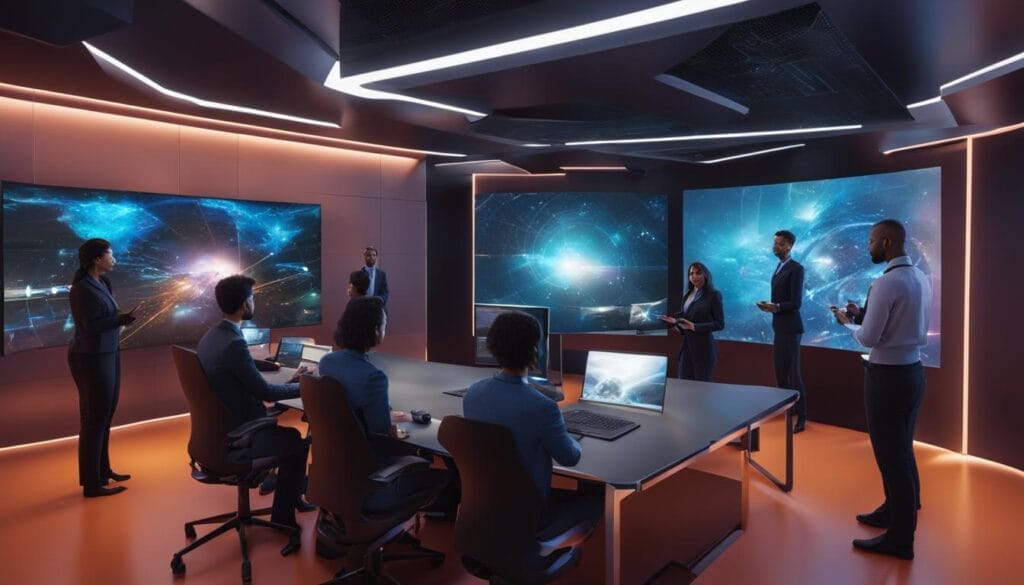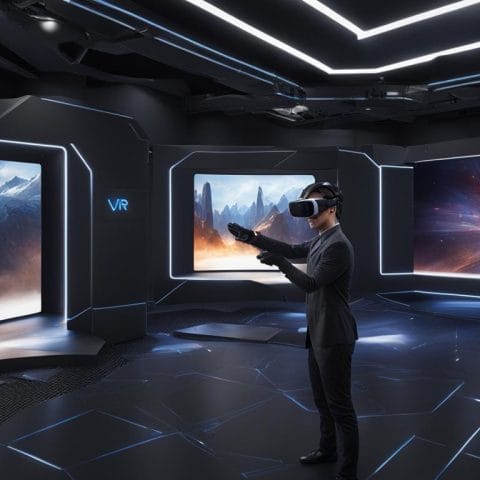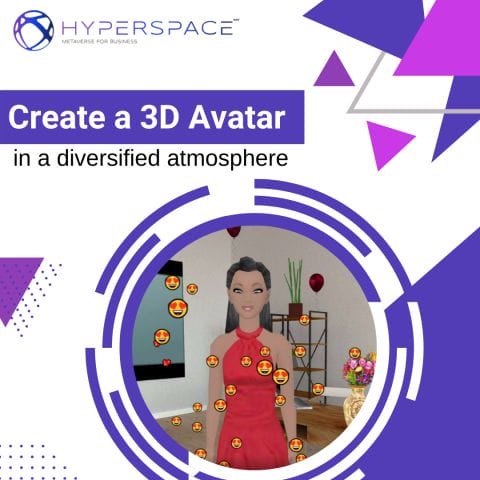The metaverse, a digital environment that allows users to interact and communicate through virtual spaces, is poised to revolutionize the business world. With advancements in technology like virtual reality, cloud computing, 5G communications, and blockchain, the metaverse opens up new opportunities for innovation, collaboration, and growth in businesses.
By improving communication, enabling immersive experiences, and creating direct engagement with customers, the metaverse will reshape traditional business landscapes. It will create virtual spaces where businesses can explore new ideas, collaborate with partners and clients, and foster growth in an increasingly digital world.
As businesses adapt to and embrace the metaverse, they can tap into its vast potential for creating unique customer experiences, enhancing employee training, and redefining remote collaboration. The metaverse will fuel innovation, unlock new revenue streams, and drive the digital transformation of industries across the board. It is an exciting time for businesses to explore the possibilities and thrive in the metaverse era.
Key Takeaways:
- The metaverse will revolutionize business landscapes by providing immersive virtual spaces for innovation, collaboration, and growth.
- Advancements in technology like virtual reality, cloud computing, 5G communications, and blockchain are driving the development and adoption of the metaverse.
- Businesses can directly engage with customers and create personalized experiences in the metaverse, transforming traditional marketing methods.
- The gaming industry will experience significant changes with the metaverse, enabling immersive and social gaming experiences.
- In industries like asset management and retail, the metaverse will streamline processes, reduce costs, and enhance customer experiences.
What is the Metaverse and its Business Implications?
The metaverse is an exciting concept that has gained momentum in recent years. Simply put, it is a 3D virtual environment that enhances the internet experience and offers users immersive interactions. From a business perspective, the metaverse has significant implications. It aims to revolutionize communication between people and businesses, creating new opportunities for engagement. In this section, we will explore the metaverse in more detail and understand its potential impact on the business landscape.
In the metaverse, users can create virtual representations of themselves called avatars. These avatars can explore different virtual locations and interact with others, resulting in a dynamic and engaging experience. From a business standpoint, the metaverse opens up new possibilities for customer engagement. Instead of relying solely on traditional marketing methods, businesses can now connect with their customers through avatars, creating more personalized and immersive interactions.
Traditional marketing has its limitations, but the metaverse can overcome these barriers. With the metaverse, businesses can transcend geographical boundaries and reach customers anywhere in the world. They can create virtual storefronts, offer virtual shopping experiences, and provide innovative ways for customers to try products before making a purchase. The metaverse also enables collaborative tasks and interactions across vast distances, transforming the way businesses communicate and work together.
In conclusion, the metaverse represents a new frontier for businesses to explore. It offers exciting opportunities for immersive experiences, enhanced communication, and innovative customer engagement. By embracing the metaverse and its business implications, companies can stay ahead of the curve and thrive in the evolving digital landscape.
Table: Business Implications of the Metaverse
| Implication | Description |
|---|---|
| Enhanced Communication | The metaverse allows for immersive and interactive communication between businesses and customers, transcending geographical boundaries. |
| Immersive Experiences | Through the metaverse, businesses can offer customers immersive experiences, enabling them to explore virtual environments and interact with products. |
| Collaborative Tasks | The metaverse facilitates collaborative tasks and interactions, enabling businesses to work together across large distances. |
| Global Reach | With the metaverse, businesses can reach customers anywhere in the world, expanding their market reach and potential customer base. |
| Personalized Interactions | By leveraging avatars in the metaverse, businesses can create personalized and tailored interactions with customers, enhancing customer satisfaction and loyalty. |
The Metaverse Impact on Gaming Industry
The metaverse is set to revolutionize the gaming industry, offering new possibilities for immersive and interactive experiences. Virtual reality (VR) gaming platforms such as Oculus Rift and HTC Vive have already made a significant impact, but the metaverse will take it to the next level. With the introduction of mixed reality (MR) games, players will be able to incorporate real-life objects into their gameplay, creating even more immersive and complex play experiences.
One of the key changes that the metaverse will bring to the gaming industry is the ability for players to interact with each other through virtual worlds. This will enable the formation of virtual teams and self-organized multiplayer games, fostering a sense of community and camaraderie among players. The metaverse will break the boundaries of physical location, allowing players from different parts of the world to come together and share gaming experiences in real-time.
In addition to the social aspect, the metaverse will also enhance the overall user experience in gaming. Players will have the opportunity to explore virtual worlds, discover new environments, and engage with interactive elements in ways that were previously unimaginable. Whether it’s exploring a fantasy realm, solving puzzles, or participating in epic battles, the metaverse will provide a level of immersion and interactivity that goes beyond traditional gaming experiences.
Table: Metaverse vs. Traditional Gaming
| Metaverse | Traditional Gaming |
|---|---|
| Immersive virtual worlds | Fixed game environments |
| Real-time multiplayer interactions | Offline or limited multiplayer options |
| Incorporation of real-life objects | Strictly virtual gameplay |
| Self-organized multiplayer games | Pre-defined multiplayer experiences |
With the metaverse, the gaming industry will undergo a transformative shift, offering players a new level of immersion, interaction, and social connection. Traditional gaming experiences will be surpassed by the limitless possibilities and collaborative opportunities that the metaverse presents. As technology continues to advance, the metaverse will pave the way for the future of gaming, where players can go beyond the confines of their physical world and explore boundless virtual realms.
Metaverse in Asset Management in Industrial Sectors
The metaverse is set to revolutionize asset management in industrial sectors such as manufacturing, oil & gas, energy, and mining. This immersive digital environment breaks time and space boundaries, enabling technicians to maintain assets remotely and collaborate virtually across multiple sites in real-time.
By leveraging the metaverse, companies can achieve significant cost savings by reducing travel expenses and improving efficiency in asset maintenance and repair. Technicians can access digital replicas of physical assets, conduct remote inspections, and perform virtual repairs. This eliminates the need for costly and time-consuming physical site visits, resulting in streamlined operations and reduced downtime.
Collaboration in the metaverse also enhances communication and knowledge sharing among cross-functional teams. Technicians can work together to troubleshoot issues, share best practices, and train new employees in virtual environments. This collaborative approach not only improves problem-solving capabilities but also enables companies to leverage the expertise of their global workforce more effectively.
Metaverse Asset Management Benefits:
- Remote maintenance and inspections
- Real-time collaboration across multiple sites
- Cost savings from reduced travel expenses
- Streamlined operations and reduced downtime
- Improved communication and knowledge sharing
“The metaverse has the potential to transform asset management in industrial sectors, offering new possibilities for collaboration and cost savings.”
Metaverse Applications in Retail
The metaverse is set to revolutionize the retail industry, offering new opportunities for immersive and interactive customer experiences. With virtual shopping becoming a reality, customers can now try products before purchasing them, using virtual reality headsets or mobile devices. This innovative technology allows companies to create virtual storefronts, enabling customers to browse and interact with products in a virtual environment.
The metaverse also enhances the retail customer experience through augmented reality. Customers can virtually try on clothes, visualize how furniture will fit in their homes, and even see how products will look in different settings. This level of personalization and interactivity creates a unique shopping experience that sets businesses apart from traditional brick-and-mortar stores.
As e-commerce continues to grow, the metaverse offers new ways for retailers to engage with customers. It provides a platform for targeted marketing campaigns, virtual events, and exclusive promotions. By leveraging the metaverse, retailers can expand their reach, attract new customers, and build deeper connections with their target audience.
Overall, the metaverse presents a game-changing opportunity for the retail industry. By embracing virtual shopping, interactive experiences, and innovative marketing strategies, retailers can thrive in an increasingly digital world.
Table: Comparison of Traditional Shopping and Metaverse Shopping
| Traditional Shopping | Metaverse Shopping | |
|---|---|---|
| Customer Experience | Limited interactivity and personalization | Immersive and interactive experiences |
| Product Try-On | Physical try-on in stores | Virtual try-on using avatars |
| Product Visualization | Limited visualization options | Augmented reality visualization in real-world settings |
| Reach | Local or regional reach | Global reach |
| Marketing Opportunities | Traditional advertising and promotions | Virtual events, targeted marketing campaigns, and exclusive promotions |
Table: A comparison of traditional shopping and metaverse shopping highlights the significant advantages that the metaverse offers in terms of customer experience, product try-on, product visualization, reach, and marketing opportunities.
With the metaverse, retailers can create an immersive and personalized shopping experience that transcends physical limitations. By embracing this new technology, retailers can stay ahead of the curve and meet the evolving needs and expectations of their customers in the digital age.
Metaverse and the Future of Travel and Tourism
The metaverse is poised to revolutionize the travel and tourism industry, offering exciting opportunities for immersive experiences and virtual exploration. Through the use of virtual reality and mixed reality technologies, travelers will be able to embark on virtual journeys, exploring destinations and experiencing the sights and sounds before setting foot in the physical world.
Virtual reality experiences will transform the way we travel, allowing us to walk through streets, visit landmarks, and even interact with businesses and attractions using holographic avatars. Imagine being able to sample local cuisine in a virtual restaurant while chatting with the chef or manager, all from the comfort of your own home. The metaverse will bring these experiences to life, blurring the lines between the physical and digital realms.
With the metaverse, the possibilities for the future of travel and tourism are vast. By harnessing the power of virtual reality, businesses can provide travelers with a taste of what their destination has to offer, enticing them to book their next adventure. Virtual travel experiences can also be used as a marketing tool, allowing hotels, airlines, and tour operators to showcase their offerings in a unique and engaging way.
Table: Virtual Reality Experiences in the Metaverse
| Virtual Experience | Description |
|---|---|
| Virtual City Tours | Explore famous cities and landmarks through immersive virtual tours. |
| Virtual Adventure Activities | Try thrilling activities such as skydiving or bungee jumping in a virtual environment. |
| Virtual Hotel Visits | Take a virtual tour of hotels and resorts to see their amenities and room options. |
| Virtual Dining Experiences | Sample local cuisine and interact with chefs and restaurateurs in virtual restaurants. |
The metaverse holds great promise for the travel and tourism industry, offering a new way for travelers to explore and engage with destinations. Businesses that embrace this technology will be at the forefront of innovation, providing unforgettable experiences for their customers and staying ahead in the digital age of travel.
Advertising in the Metaverse

As the metaverse continues to evolve, businesses are presented with new and exciting opportunities in advertising. The metaverse, with its virtual worlds and immersive experiences, provides a unique platform for marketers to engage with their target audience in innovative ways. Virtual reality (VR) and augmented reality (AR) technologies open up endless possibilities for creating immersive and interactive advertising campaigns that captivate and connect with consumers.
Advertising in the metaverse allows companies to leverage the power of virtual reality to create unforgettable brand experiences. Imagine a virtual world where users can explore a virtual store, interact with products, and even make purchases without leaving the comfort of their own homes. This opens up a whole new realm of possibilities for e-commerce and virtual retail experiences.
Furthermore, sponsored events and virtual product placements in the metaverse enable businesses to seamlessly integrate their brand into the virtual environment, reaching consumers in a contextually relevant and engaging way. Virtual billboards and other forms of advertising within virtual worlds provide additional opportunities for companies to showcase their products and services to a highly targeted audience.
“The metaverse presents a paradigm shift in advertising, offering marketers the ability to create immersive and interactive campaigns that break free from traditional media limitations.” – Marketing Expert
Marketing Opportunities in the Metaverse
With the metaverse, businesses have the potential to reach a global audience and create engaging experiences that leave a lasting impression. Here are some of the key marketing opportunities that the metaverse offers:
- Virtual Brand Experiences: Businesses can create virtual environments that allow users to fully immerse themselves in the brand, resulting in deeper connections and increased brand loyalty.
- Targeted Advertising: Virtual worlds provide valuable data on user behavior and preferences, allowing businesses to tailor their advertisements and target specific demographics more effectively.
- Interactive Campaigns: The metaverse enables businesses to engage consumers through interactive games, quizzes, and virtual events, increasing brand interaction and driving customer engagement.
- Social Media Integration: Integrating social media platforms into the metaverse allows businesses to leverage user-generated content and facilitate social sharing, amplifying their brand reach and visibility.
As the metaverse becomes an increasingly integral part of our digital landscape, businesses that embrace and explore the advertising opportunities it offers will be well-positioned to thrive in this new era of marketing.
Metaverse’s Impact on Customer Service
The emergence of the metaverse brings about new challenges and opportunities for businesses, particularly in the realm of customer service. As customers increasingly embrace the metaverse, it becomes imperative for companies to adapt their customer service strategies to this evolving digital landscape. Similar to how social media platforms have become an essential channel for customer interactions, the metaverse is set to become a platform where customers expect businesses to be present and responsive.
Businesses should actively monitor metaverse interactions through social media listening tools and metaverse-specific monitoring platforms. This allows them to gain insights into customer experiences, collect feedback, and promptly respond to customer inquiries and concerns. By integrating customer service into the metaverse, businesses can provide a seamless and personalized experience, establishing stronger connections with their customers.
In addition to monitoring and responding to customer interactions, businesses can leverage the metaverse to offer support services within virtual worlds. This could include in-world customer service avatar representatives who can guide and assist customers, virtual help desks, or even virtual workshops and training sessions to address common customer issues. By providing support within the metaverse, businesses can enhance the overall customer experience and build trust and loyalty.
Benefits of Embracing Metaverse Customer Service
Embracing customer service in the metaverse offers several advantages for businesses. Firstly, it allows for a more immersive and interactive customer experience, enabling customers to engage with businesses in a virtual environment that mirrors real-life interactions. This enhanced level of engagement can strengthen customer relationships and drive customer satisfaction and loyalty.
Secondly, integrating customer service into the metaverse provides businesses with a unique opportunity to showcase their brand and products in innovative ways. By leveraging virtual spaces, businesses can create immersive product demonstrations, interactive tutorials, or virtual showrooms, allowing customers to experience products and services firsthand without physical limitations.
Lastly, the metaverse offers businesses the ability to tap into a global customer base, transcending geographical boundaries. As customers from different parts of the world converge in virtual spaces, businesses can expand their reach and cater to an international audience. This opens up new markets and revenue streams, boosting growth and profitability.
Metaverse and Employee Training

The metaverse presents exciting opportunities for employee training, utilizing the power of virtual reality (VR) and interactive learning. This emerging technology allows companies to create immersive and engaging training experiences for their employees. With VR, employees can be placed in realistic simulations, where they can practice tasks, receive real-time feedback, and develop crucial skills in a safe and controlled environment.
Interactive learning in the metaverse goes beyond traditional training methods, offering a more engaging and memorable experience. Employees can actively participate in virtual simulations, collaborate with colleagues, and interact with virtual objects. This hands-on approach enhances knowledge retention and allows employees to apply their learnings in practical scenarios.
Furthermore, the metaverse provides a cost-effective solution for employee training. Physical classrooms and travel expenses can be eliminated, making training accessible to a wider range of employees. Companies can also track the progress of their employees in the virtual environment, enabling them to identify areas of improvement and tailor training programs accordingly.
Benefits of Employee Training in the Metaverse
- Immersive and engaging learning experiences
- Real-time feedback and performance evaluations
- Cost-effective and accessible training solutions
- Enhanced collaboration and knowledge sharing
- Improved knowledge retention and application
Companies that embrace employee training in the metaverse can equip their workforce with the skills and knowledge needed to thrive in the digital age. By utilizing the power of VR and interactive learning, businesses can stay ahead of the curve and empower their employees to reach their full potential.
The Future of Remote Collaboration in the Metaverse
The metaverse is set to transform the way we collaborate remotely, taking virtual meetings to new immersive levels. In a world where virtual meetings have become the norm, the metaverse offers exciting possibilities for teams to collaborate and make real-time decisions in immersive 3D environments. By breaking down geographical barriers and providing new opportunities for global collaboration, the metaverse is poised to enhance team productivity and efficiency.
Imagine being able to walk through virtual spaces with your colleagues, discussing projects, brainstorming ideas, and solving problems in a visually engaging and interactive environment. With the metaverse, remote collaboration becomes more than just video calls and screen sharing—it becomes a truly immersive experience where team members can interact and engage with one another.
Virtual meetings in the metaverse offer a range of benefits. They enable teams to have a greater sense of presence, as if they were physically present in the same space. This sense of presence can enhance communication and foster stronger connections between team members. Furthermore, the metaverse allows for real-time collaboration, enabling teams to work together on documents, share ideas, and make decisions instantaneously. This level of interactivity and immediacy can significantly speed up the decision-making process and improve overall team efficiency.
As businesses continue to adapt to remote work environments, the metaverse presents an exciting prospect for the future of remote collaboration. By harnessing the power of immersive experiences, virtual meetings in the metaverse have the potential to revolutionize the way teams work together, leading to increased productivity, enhanced creativity, and improved collaboration.
Table: Benefits of Remote Collaboration in the Metaverse
| Benefits | Description |
|---|---|
| Immersive experiences | Virtual meetings in the metaverse provide a sense of presence, making participants feel as if they are physically together. |
| Real-time collaboration | Teams can work together on documents, share ideas, and make decisions instantaneously, leading to faster and more efficient collaboration. |
| Enhanced communication | The metaverse allows for more interactive and engaging communication, leading to stronger connections between team members. |
| Increased productivity | By providing a highly immersive and interactive environment, the metaverse can boost team productivity and creativity. |
Conclusion
The metaverse has the potential to revolutionize various industries and create numerous business opportunities. As we navigate the digital revolution, it is crucial for businesses to embrace the metaverse and adapt to the evolving landscape. This new frontier offers virtual real estate development, metaverse marketing, virtual entertainment, and consultation services, among many other innovative business ideas.
With the metaverse, businesses can tap into a digital ecosystem that opens up endless possibilities for growth and engagement. It is essential to stay ahead of the curve and explore the potential that the metaverse holds. The key to success lies in the ability to innovate, be adaptable, and deeply understand the metaverse’s capabilities.
As technology continues to advance, businesses need to be agile and proactive in leveraging the metaverse for their advantage. The metaverse represents a digital revolution that will reshape the way we work, communicate, and interact with customers. Embracing this transformative technology will position businesses at the forefront of innovation and create new pathways to success.
Adaptability will be the cornerstone of thriving in the metaverse. By staying abreast of the latest developments and trends, businesses can seize the vast business opportunities that the metaverse presents. The future is digital, and the metaverse is paving the way for businesses to reimagine their strategies, connect with customers in new ways, and unlock a new era of growth and prosperity.
FAQ
What is the metaverse?
The metaverse is a digital environment that allows users to interact and communicate using 3D cyber-representations of themselves and real-world objects.
How will the metaverse change business landscapes?
The metaverse will open up new virtual spaces for innovation, collaboration, and growth in the business world.
What technologies contribute to the development of the metaverse?
Advancements in virtual reality (VR), cloud computing, 5G communications, and blockchain are contributing to the development of the metaverse.
How will the metaverse improve communication?
The metaverse will enable immersive experiences and create new opportunities for businesses to directly engage with customers.
How can businesses use the metaverse to engage customers?
Businesses can create avatars and interact with customers through virtual worlds instead of traditional marketing methods.
How will the metaverse impact the gaming industry?
The metaverse will revolutionize the gaming industry by allowing players to interact with each other through virtual worlds and participate in self-organized multiplayer games.
How will the metaverse transform asset management in industrial sectors?
The metaverse will enable technicians to maintain assets remotely or collaborate virtually in real-time across multiple sites, leading to significant cost savings for companies.
How will the metaverse revolutionize the retail industry?
The metaverse will allow customers to try products before buying them using virtual reality headsets or mobile devices, and companies can offer immersive virtual shopping experiences.
How will the metaverse impact the travel and tourism industry?
The metaverse will provide virtual reality and mixed reality experiences, allowing travelers to visit destinations virtually and interact with businesses and attractions in innovative ways.
How can companies advertise in the metaverse?
Companies can explore advertising in virtual worlds, creating immersive and interactive campaigns such as virtual billboards, sponsored events, and product placements.
How should businesses adapt their customer service strategies in the metaverse?
Businesses should monitor metaverse interactions, offer support services, and incorporate customer feedback about metaverse use into their strategies.
How can the metaverse be utilized for employee training?
The metaverse can create immersive and engaging training experiences, allowing employees to learn in a safe and interactive environment.
How will the metaverse enhance remote collaboration and virtual meetings?
The metaverse will enable virtual meetings in immersive 3D environments, enhancing team productivity and breaking down geographical barriers.
What business opportunities does the metaverse present?
The metaverse offers opportunities in virtual real estate development, metaverse marketing, virtual entertainment, and consultation services, among others.




